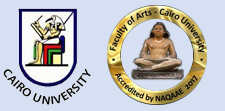عنوان المقال عربي
日本語とアラビア語の謝罪意識の対照比較 − 両母語話者が重んじる謝罪意識の同定とその要因の考察–
Disciplines
Japanese Studies
Document Type
Original Study
Keywords English
Japanese apology mentality, Arabic apology mentality, Japanese language education, semantic formulas
كلمات مفتاحية عربي
الوعي بالاعتذار عند اليابانيين, الوعي بالاعتذار عند العرب, تعليم اللغة اليابانية, الصيغة الدلالية
Abstract English
This study clarified differences in mentalities around apologies between native Japanese speakers and native Arabic speakers. It then considered factors that made such apology-related attitudes important to the speakers of each language who were surveyed. We collected and analyzed Google questionnaires administered to 115 native speakers of both languages. The questionnaires investigated the following senses involved in apologies in three contexts that took into account “superior–inferior relationships,” “degree of familiarity,” and “degree of burden.” The senses related to apologies were “apology,” “guilt,” “nuisance,” “explanation,” “compensation,” and “tolerance.” Results of the survey confirmed that Japanese native speakers tend to place importance on “apology” and “guilt” while Arabic native speakers tend to emphasize “explanation” and “tolerance.” It was inferred that the effect of Islam and Arabic social customs was a factor for native Arabic speakers to “explain” and “tolerate.” It was then concluded that native Japanese speakers inherited the tendency to “apologize” and experience “guilt” from values belonging to samurai culture and that they have been unconsciously applying these values to this day.
الملخص العربي
مقارنة بين اللغة اليابانية واللغة العربية في الوعي بالاعتذار- تحديد معنى الاعتذار الذي يقدره كل من الناطقين الأصليين ومراعاة عوامله -مرحلة الدكتوراه، جامعة طوكايطارق حسين حكميرکزت هذه الدراسة على الاختلاف في الوعي بالاعتذار بين الناطقين باللغتين اليابانية والعربية. واستهدفت الدراسة العوامل الکامنة وراء ما إذا کان الوعي بالاعتذار مهما لکلتا اللغتين. ولتحقيق هدف هذه الدراسة استهدف الباحث ١١٥ شخص لکل من اللغتين. وقام الباحث باستخدام استبانة Google وجمع البيانات من خلال تحديد ثلاثة مشاهد تتناول "العلاقة الهرميّة" و"العلاقة الاجتماعية" و"درجة تحمل العبء" وتحليلها. مواد البحث التي استخدمت للتحقق من الوعي بالاعتذار هي: (الاعتذار)، (التبرير)، (الذنب)، (المضايقة)، (التعويض)، (التسامح). نتيجة الدراسة، تم التأکد من أن الناطقين باللغة اليابانية يميلون إلى التأکيد على (الاعتذار)، و(الذنب). أما بالنسبة للناطقين باللغة العربية فقد أکدوا على (التبرير)، و(التسامح)، واستنتج الباحث أن العوامل الرئيسية وراء ذلک هي تأثير الدين الاسلامي وعادات المجتمع العربي. وأما بالنسبة لسبب تأکيد الناطقين باللغة اليابانية على (الاعتذار)، و (الذنب)، هو أنهم ما زالوا يرثون قيم الساموراي وأنهم يطبقونها دون وعي.
Recommended Citation
Hakami, Tariq
(2023)
"A Comparison between Japanese and Arabic apology mentality
− Identifying Apology-Related Attitudes Valued by Speakers of Both Languages and Considering Their Factors-,"
Journal of the Faculty of Arts (JFA): Vol. 83:
Iss.
2, Article 27.
DOI: 10.21608/jarts.2022.93869.1192
Available at:
https://jfa.cu.edu.eg/journal/vol83/iss2/27
Digital Object Identifier (DOI)
10.21608/jarts.2022.93869.1192
Receive Date
2021-10-27
Revise Date
2021-10-27
Accept Date
2022-09-27
Publication Date
4-1-2023
Publish Month
April

